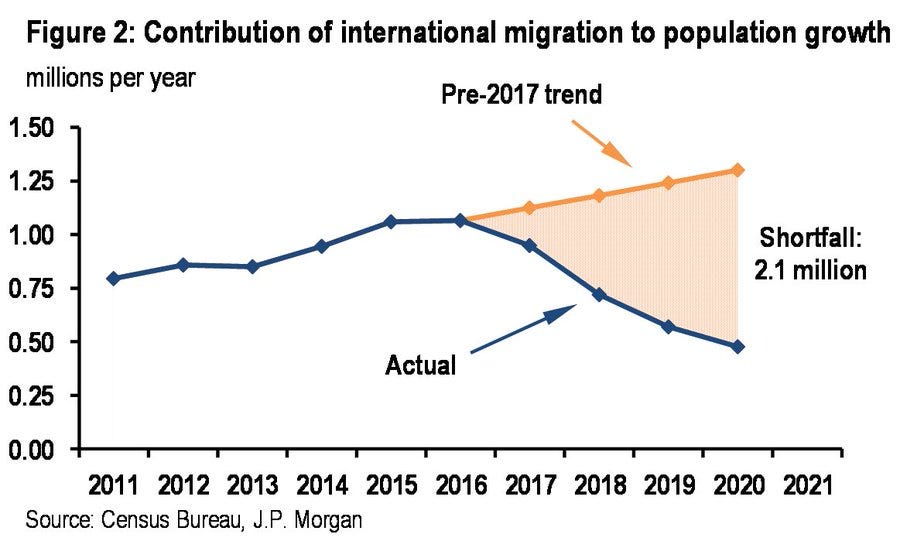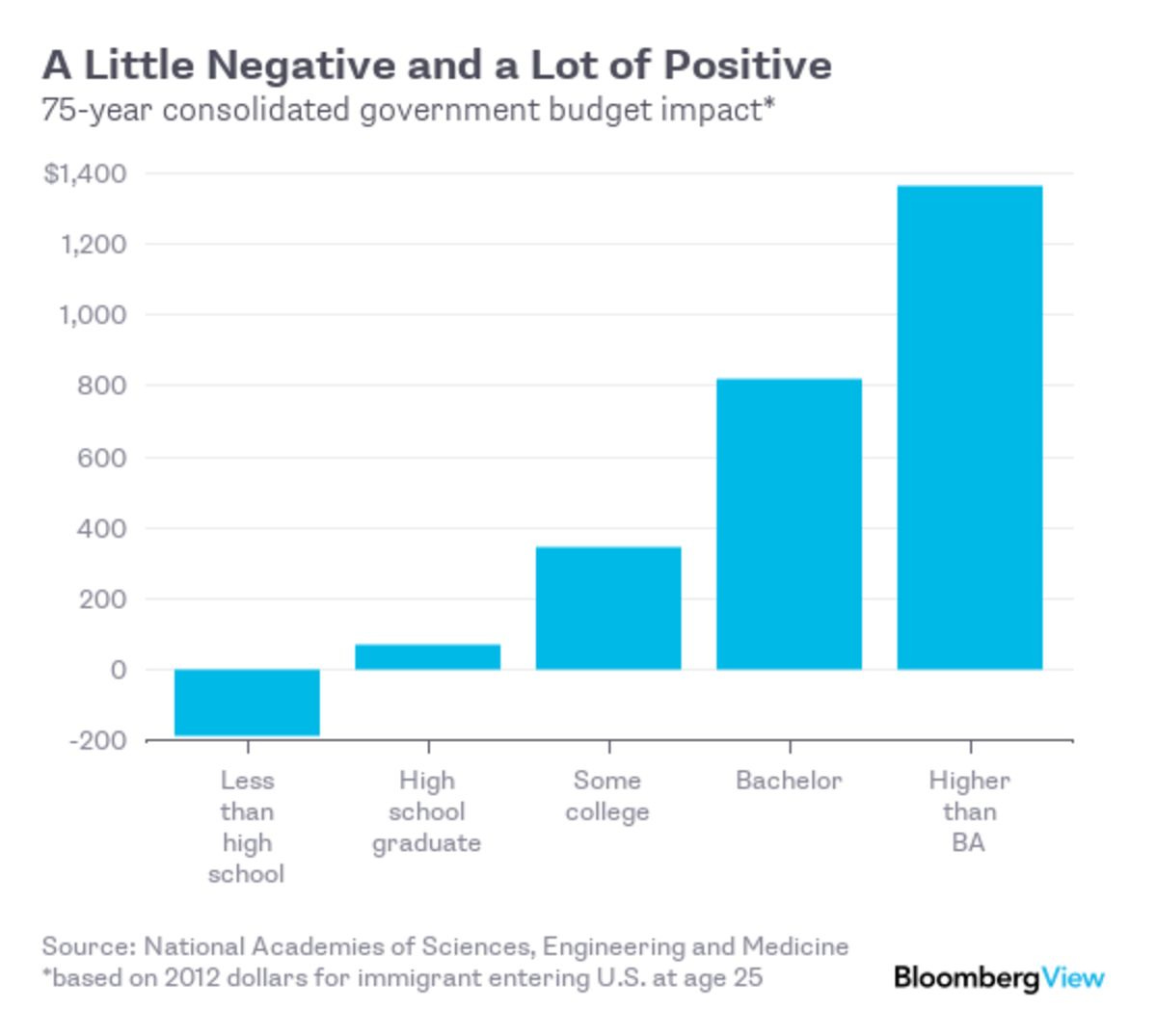America needs immigration to grow and thrive
And right-wing culture warriors like Amy Wax are standing in the way.
Amy Wax, a law professor at the University of Pennsylvania, has caused an uproar and drawn a reprimand by her university by making anti-Asian comments on a web show and in a letter:
During a Dec. 20 interview on journalist Glenn Loury’s web show…Wax criticized Asian immigration to the United States, warning of the “danger of the dominance of an Asian elite in this country.”
“If you go into medical schools, you’ll see that Indians, South Asians are now rising stars. In medicine, they’re sort of the new Jews, I guess, but these diversity, equity and inclusion initiatives are poisoning the scientific establishment and the medical establishment now,” said Wax…
Wax also said Asians in the U.S. should be more thankful. “Why should someone who emigrated from India, has taken advantage of everything our society has to offer, who is leading the good life, who’s part of the elite — why shouldn’t that person be objectively grateful? And, you know, recognize overtly all the wonderful things about our country?” she said…
“Maybe it’s just that Democrats love open borders, and Asians want more Asians here,” she wrote….”[A]s long as most Asians support Democrats and help to advance their positions, I think the United States is better off with fewer Asians and less Asian immigration.”
This is, of course, deeply racist, and it’s consistent with Wax’s record of saying similar things. Wax’s bigotry is compounded by her tendency toward profound and willful ignorance; for example, she once claimed that we should take fewer immigrants from Malaysia because Malaysia doesn’t have science and technology — ignoring the fact that Malaysia is a global hub for electronics manufacturing that does plenty of research. Wax clearly has it in for Asians, and rarely knows what she’s talking about.
But this incident showcases a phenomenon that’s larger and more important than any law professor’s personal biases. It shows how immigration attitudes on the political Right are morphing from issues of legality and economic selectivity into a full-on culture-war wedge issue. Wax’s restrictionist sentiments are aimed specifically at excluding high-skilled legal immigrants. And that seems to typify the emerging right-wing attitude toward the issue:
This is important, because a decade ago, it seemed possible that we might reach a compromise on comprehensive immigration reform; in exchange for tighter enforcement against illegal migration and a greater emphasis on selectivity, there was the hope that Republicans might allow expanded legal immigration and a path to citizenship for undocumented people who have been here a long time. That possibility now looks dead. The Right increasingly views opposition to all immigration as a non-negotiable core value.
Why? Because the Right has embraced the “Great Replacement” theory:
The racial angle here is obvious; fear that White people will become a minority figured prominently in Trump’s appeal, and still remains. But there’s also a partisan political angle: Because Asian and Hispanic voters tend to lean to the Democrats, there’s a widespread fear among Republicans that allowing more immigration from Asia and Latin America will doom the GOP to permanent minority status. Wax says this explicitly, as does Tucker Carlson. And indeed, this is not a new fear; in the early decades of the republic, Whigs and Federalists feared that Irish immigration would make the Democrats an unstoppable political force.
Some Democrats have done their part to stoke this fear — most notably John Judis and Ruy Teixeira in their 2004 book The Emerging Democratic Majority, but also many others since. So I don’t want to put 100% of the blame on Republicans here; yes, Wax’s bigotry and Carlson’s cynical exploitation of racial anxieties are reprehensible, but it’s also true that if you spend a decade saying “Neener neener, immigration is going to make our party win forever”, it’s understandable that the other party will freak out. Perhaps the Hispanic shift toward the GOP will eventually neutralize this fear, but it’s way too early to tell.
In any case, the morphing of immigration into a culture-war wedge issue represents a huge economic risk for the United States of America. Immigration isn’t just important for our identity and culture; it’s also crucial for our economy. There are a number of reasons for this, but they all come down to the challenge of an aging, shrinking population.
Fewer immigrants means a smaller, older America
In the 2000s, the U.S. had much more rapid population growth than other rich countries, due to a combination of large-scale immigration and high-ish fertility rates. Both of those factors are now gone. U.S. fertility rates fell in the 2010s, and are now back down to 1970s levels:
The pandemic may lower those rates even further.
Meanwhile, U.S. immigration has fallen substantially. First, the huge wave of immigration from Mexico in the 80s, 90s, and 00s dried up around 2007, partly as a result of lower fertility and higher incomes in Mexico. Trump’s restrictions and the chilling effect of his rhetoric compounded the problem, and then the pandemic arrived and totally clobbered immigration levels. The Peterson Institute for International Economics has a good chart showing the decline over the years:
And J.P. Morgan shows how reduced immigration is expected to be a drag on U.S. population growth in the years to come:
Anti-immigration people argue that we should address this impending shrinkage by raising fertility rates. And in fact I agree that we should try to do this, not out of any kind of nativism, but because the main reason Americans aren’t having as many kids as they want is economic; people deserve more economic security and the money and time to raise larger families if they so choose.
But at the same time, we have to recognize that this is unlikely to have much of an effect. The economist Lyman Stone, who is rabidly pro-natalist and obsessive about reading the relevant literature, finds that pro-natalist policies have only a modest effect. So yes, we should pass a big Child Tax Credit and do other things to make child-rearing less of an economic burden, but it’s not going to do that much.
So if we’re going to keep our population growing, it means we’re going to have to raise immigration again.
A smaller America means less investment
OK, but why should we raise our population? A smaller country isn’t necessarily a poorer one. But successful small countries tend to be located next to large population centers. Take a look at this population density map of the world:
The big population centers are Northeast Asia, India, Europe, and West Africa. This means that successful small countries like the Netherlands, Singapore, or Switzerland have access to those large nearby markets.
And large markets really are the key here. Companies want to put their factories and their offices close to where their customers — or potential customers — live. Of course, income matters too — the richer the locals are, the more they’ll buy. Domestic market size — basically, population times income — is a very strong predictor of foreign direct investment.
And as poorer countries catch up to richer ones, income differences matter less and less, and population matters more. And here, America is well behind Asia. Always remember this map:
If you’re a multinational company — whether based in the U.S., Japan, France, or wherever — where do you want to put your offices and factories? As Asia gets richer, it becomes a more and more attractive destination for investment — and the U.S. a less and less attractive destination, in comparison. This will be doubly true if the U.S. population shrinks, because that means the U.S. market will be an even less attractive place to be invested in 20 years hence.
Of course there are other considerations besides market size. You’ll also want a talented young workforce. And if America ages and shrinks, it won’t have that either.
In economics, these kinds of considerations are called agglomeration effects. They are the reason that some regions of the world end up rich and industrialized, while others end up as backwaters that survive by exporting minerals and food. Can America really thrive as the world’s equivalent of South Dakota? I think not. The only way to retain our position as one of the world’s key industrial centers is to keep our population young and growing.
An older America means more burden on workers and taxpayers
But the threat of population decline goes well beyond agglomeration effects. An aging population presents a very immediate danger to our standard of living. The main reason is that population aging creates a higher old-age dependency ratio. This means that the older your population gets, the fewer workers there are to support each retiree.
In 2005, there were about 5.4 working-age people to support each retiree in America. Today, there are only about 3.9.
This represents an increasingly crushing burden on our working-age people. Working people support retirees in three ways — by taking care of their family members, by giving their family members money, and by paying taxes to support health, pensions, and other government services for old people.
As Americans have fewer kids, each young person will eventually have to shoulder more of the burden of caring for their aged parents — both financially and in terms of actually taking care of them. But taxes will also go up, because fiscally the government will need more tax money for things like Medicare. That’s not good.
Immigrants can help shoulder all of these burdens. They can take care of old people directly — a disproportionately high proportion of the workers who care for elderly Americans are immigrants:
Immigrants also pay a lot of taxes, which helps ease the fiscal burden on the native-born. A famous 2016 report by the National Academy of Sciences found that all but the least-educated immigrants will make a strongly positive contribution to the nation’s fiscal balance, by paying taxes, by using relatively few government services, and by having kids who grow up to earn a lot and pay a lot of taxes.
Without a substantial level of immigration — especially the type of immigrants Amy Wax is trying to keep out — government coffers will run empty, and we’ll have to turn to either austerity or deficit spending. That will not end well.
So we need those young workers to keep coming in — both the health care and eldercare workers who make it cheap to care for retired Americans, and the educated workers whose higher salaries add the most to our tax revenues.
The Right needs to get over their fear of immigration
Of course, the Biden administration is trying to revitalize skilled legal immigration. But because the U.S. has become a vetocracy, he’ll need some Republicans to help him if he’s going to get anything passed. If the GOP takes the Wax/Carlson line that all immigration is a threat to the nation, we will be a smaller, weaker country.
So the Right needs to get over its fear of immigration. The Hispanic shift toward the GOP could help with that — as Hispanic voters become more evenly divided between the parties, Republicans might stop seeing immigrants as imported votes for the other team. In fact, there may be a similar shift underway among Asian voters in some areas; Chinese voters, upset about crime and the progressive threat to selective schools, recently came out in force for conservative candidates in NYC. In fact, Asian Americans used to be a Republican voting bloc, so there’s no reason their partisan affiliation is set in stone.
Republicans need to follow the example set by the Federalists and Whigs in the 19th century. Those parties countered the Democratic advantage among immigrants by courting the Irish, eventually making substantial inroads and winning plenty of elections. Generations later, the Republicans made big gains with Italian and East European Americans in the late 20th century, helping to secure victories for Nixon and Reagan. Republicans can appeal to the children and grandchildren of Hispanic and Asian immigrants with messages of economic opportunity, law and order, traditional values, etc. etc.
People on the Right should also put aside their fear of a majority-minority society; it doesn’t always turn out like California. Texas, widely regarded as the paragon of red states, saw White people become a minority in 2005. And yet it is still culturally conservative, still economically libertarian, and still solidly Republican. In fact, Texas Latinos’ rapid shift to the GOP is a big reason why Democrats’ hopes for Blue Texas look to have evaporated.
But if the Republican party as a whole buys into the absurd Amy Wax stance that Asians are some kind of threat to the nation, then they won’t be able to win over the increasingly important Asian vote. And their intransigence will cause America to suffer economically from a shrinking population and rising dependency ratio, with elderly Republican voters bearing the brunt of rising taxes and eldercare costs.
American society thrives on immigration — it’s our lifeblood, not just culturally and ideologically, but economically. Throughout our history there have always been people like Amy Wax who didn’t believe newcomers would make good Americans. And there have always been people like Tucker Carlson who stirred up fear of immigrants for their own benefit. They were always, always wrong. Don’t listen to them this time.












The anti-immigration comments on this thread made me angry but i don't have time to round up the links i'd need to engage in a sufficiently ~popularist~ way, so i'll just say: has Amy Wax talked to, like, one Asian ever? Like, a single one. How could you possibly sustain the idea that Asian potential immigrants (people with a set of heritages spanning MORE THAN HALF OF HUMANITY) are a monolith? As usual, the thing that astounds about racism is its sheer stupidity.
I spent far more time than I’d like to admit arguing in the comment thread of Glenn Loury’s Substack (where the Wax interview and follow up appeared) that yes, it IS racist to (effectively) say “Asians suck and we need fewer of them in America.” People have lost their minds. I look forward to the Foundation Against Intolerance and Racism, on whose board Glenn Loury sits, releasing a statement against Wax (won’t hold my breath…)